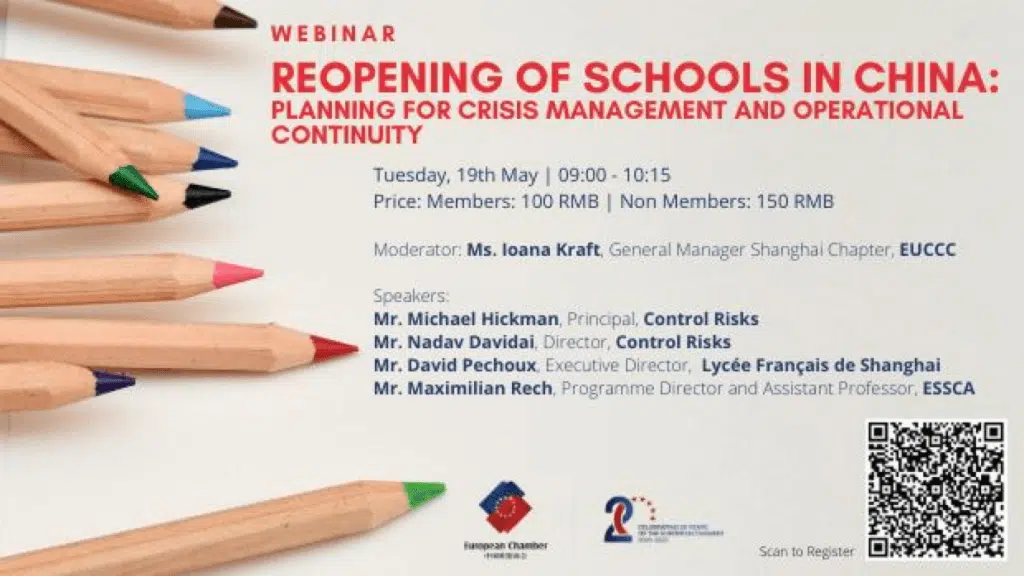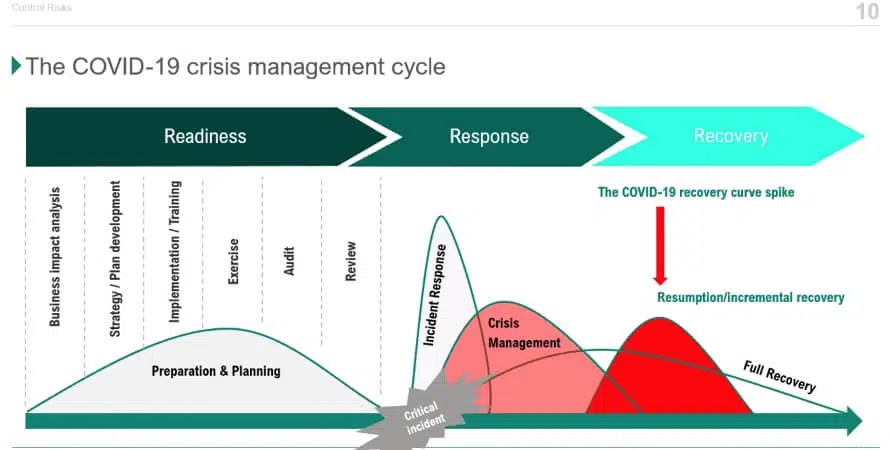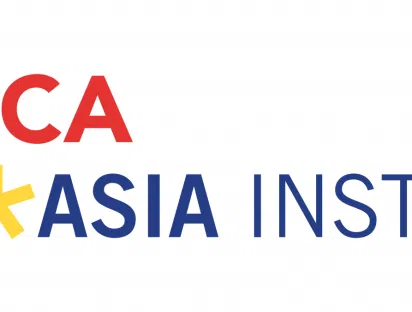19 May 2020
Report by Maximilian RECH & XIANG Jie
The European Chamber in China organised a webinar entitled “Reopening of Schools in China” on Tuesday, 19 May 2020. Focusing on crisis management and operational continuity, the chamber welcomed Mr. Michael Hickman, Principal, and Mr. Nadav Davidai, Director of Control Risks, a risk consultancy, who gave a quick overview of the challenges in the education sector related to the outbreak of the Coronavirus Infectious Disease 2019 (Covid-19) in China and Australia. The consultants paid close attention to institutional and governmental actors with a particular focus on re-establishing operational continuity in the education sector.
Thereafter, Mr. David Pechoux, Executive Director of the Lycée Français de Shanghai and Mr. Maximilian Rech, Director of Studies and Assistant Professor at ESSCA Shanghai joined the panel discussion moderated by Ms. Ioana Kraft, General Manager, European Chamber’s Shanghai Chapter.
Several topics took centre stage during the meeting as the experts focused on the Covid-19 situation in China and on-going concerns such as sanitary cleanliness, other precautionary measures such as the logistics of distancing, or challenges with regards to travel restrictions imposed both domestically and abroad. With regards to the education sector, the discussion focused on how schools should re-evaluate scenario planning, crisis management and operational continuity in light of a fundamentally new situation. Best practices on how to involve parents and other stakeholders in crisis management efforts were also exchanged.
During the discussion, Mr. RECH introduced how ESSCA Shanghai coped with the crisis during the outbreak, with regards to crisis management, digitisation and pedagogy.
Crisis Management
Referring to Michele Wucker’s thought-provoking bestseller The Gray Rhino, Rech explained how institutions know about obvious dangers of highly probable, high impact events, but may choose to ignore the ‘grey rhino’ event, as they are not sure when it will happen and how badly it may affect their respective operations. In that sense, Wucker advocates to no longer neglect these events and suggests that decision-makers prepare adequately. This is equally true for higher education institutions. In his article on “Managing Risk to Higher Education Institutions in an Uncertain World” Ulrich Hommel of the EFMD Global Network emphasises that universities which have formulated contingency plans, developed crisis management scenarios, and designated a risk management committee greatly increase resilience in challenging times. In other words, institutions that are better prepared tend to fare exponentially better. Control Risks’ Hickman and Davidai translated this into three stages in the crisis management cycle: 1) Readiness, 2) Response and 3) Recovery.
The question then remains; how did ESSCA Shanghai fare before, during and after the crisis? In response to the critical incidence, ESSCA Shanghai went into crisis management mode and initiated the response phase. It was the preparatory phase of readiness that allowed the institution to quickly respond, however.
Digitisation
In China, ESSCA followed all governmental regulation and specific measures related to local circumstances, of course. In addition, ESSCA Shanghai was focusing first and foremost on the concerns of students and their families. Plenty of international students left for their respective home countries in light of a rapidly deteriorating situation in China and around the world. Given these difficult circumstances, this trend was expected, and the International Relations Department accompanied students and their families in the endeavour.
The next step related to ensuring operational continuity in light of geographical distance and new precautionary measures such as the logistics of distancing required the institution to initiate online campus operations. It is at this moment, that preparatory readiness paid off. ESSCA Shanghai has engaged in early preparation for digitisation for many years. Students have online access to all essential services including the Mediathèque, our online library, eCampus and Moodle as well as the pedagogical platforms provided by Microsoft Office 365. Since three years, we regularly use online conferencing platforms such as Microsoft Teams, Skype Enterprise and Lifesizecloud. With regards to online evaluation and examination, we have spearheaded the institution’s efforts to introduce a software that allows every student to write their exams on their respective personal computers. This software allows for in-presence as well as online evaluations and is in use since fall semester 2014.
With regards to the Covid-19 pandemic, ESSCA Shanghai was first to be affected and embarked on the journey of online distance learning experience just after the Chinese New Year break as of Monday, 3 February 2020. Our experiences in China thereby allowed the institution as a whole to gather valuable experience to subsequently implement similar measures on the other campuses in France and Hungary.
Some key figures that illustrate the sheer size and scope of online operations at the eight campuses of ESSCA School of Management were communicated by Dean Jean Charroin who specified that in the week of 13 to 17 April 2020 the institution’s information technology services recorded the following statistics:
• 1.112.896 minutes of audio conferences;
• 766.998 minutes of video conferences;
• 120.368 minutes of shared screens;
• 42.881 messages exchanged on Microsoft Teams;
• 13.039 meeting participants.
Pedagogy
Finally, it was up to each professor to rapidly adapt the curriculum of each module to a new digital learning environment while seeking to provide the best experience possible to the students involved. Asynchronistic learning is important in this context. The asynchronistic approach to pedagogy clarifies what elements of the learning experience are key in stimulating curiosity in young people’s minds and what elements of the curriculum can be provided to students via alternative media. There should be no mistake as to the most effective learning experience that will always require offline interaction, but it is important to seek to engage the students during the precious moments of interaction available during the online distance learning experience.
One such element includes the concept of flipped classrooms; the idea behind is simple and focuses on spending less time with top-down teaching, and instead encourages individual learning outside of the classroom, while prioritising more time for interaction to address questions, conduct exercises or use shared online whiteboard spaces as a tool. Active learning such as engaging students in role-plays is similarly effective. The simulation game on negotiation skills is one such example and highlights innovative formats such as collaboration in shared documents in preparation and during the simulation as well as online voting with instantaneous visualisation. Thereby the students learn how to harness the power of technology to work together in teams while collaborating to achieve better results.
While all of these examples have helped the institution to provide an online learning experience that is thought-provoking and engaging, it was necessary to remind all webinar participants that the best experience is still to ‘negotiate offline’ if possible.
In that sense, the Lycée Français de Shanghai as well as ESSCA School of Management are very much looking forward to welcoming back all students on the respective campuses and have implemented all necessary precautionary measures of sanitary cleanliness, the logistics of sufficient distancing, and have disinfected all campuses in China, France and Hungary.
After the Questions and Answers session with the audience, the European Chamber’s General Manager Ioana Kraft shared her closing remarks for the webinar.
Further reading
- EFMD Executive Academy (2020). Leading with Impact. Including a session on ‘Fostering Resilience in Program Provision’. EFMD Global Network.
- European Chamber of Commerce in China (2020). Reopening of Schools in China: Planning for Crisis Management and Operational Continuity. Webinar series of the Working Group on Education.
- HOMMEL, Ulrich (2020). Managing Risk to Higher Education Institutions in an Uncertain World. University World News.
- WUCKER, Michele (2016). The Gray Rhino. St. Martin’s Press.



 Prior to joining Control Risks, Michael worked with several international law firms including Cleary Gottlieb, Simmons & Simmons, Fried Frank and Haiwen, a leading Chinese corporate law firm. Michael has authored numerous articles on mergers and acquisitions and securities regulations in China appearing in the International Financial Law Review, Asia Law & Practice, China Law & Practice and others. He was co-author of the China Chapter, The Anti-Bribery and Anti-Corruption Review (ed. Mark Mendelsohn), Law Business Research, 2013, and co-author of the China Chapter, Corporate Governance, Global Legal Group (London), 2014 and 2015.
Prior to joining Control Risks, Michael worked with several international law firms including Cleary Gottlieb, Simmons & Simmons, Fried Frank and Haiwen, a leading Chinese corporate law firm. Michael has authored numerous articles on mergers and acquisitions and securities regulations in China appearing in the International Financial Law Review, Asia Law & Practice, China Law & Practice and others. He was co-author of the China Chapter, The Anti-Bribery and Anti-Corruption Review (ed. Mark Mendelsohn), Law Business Research, 2013, and co-author of the China Chapter, Corporate Governance, Global Legal Group (London), 2014 and 2015.





